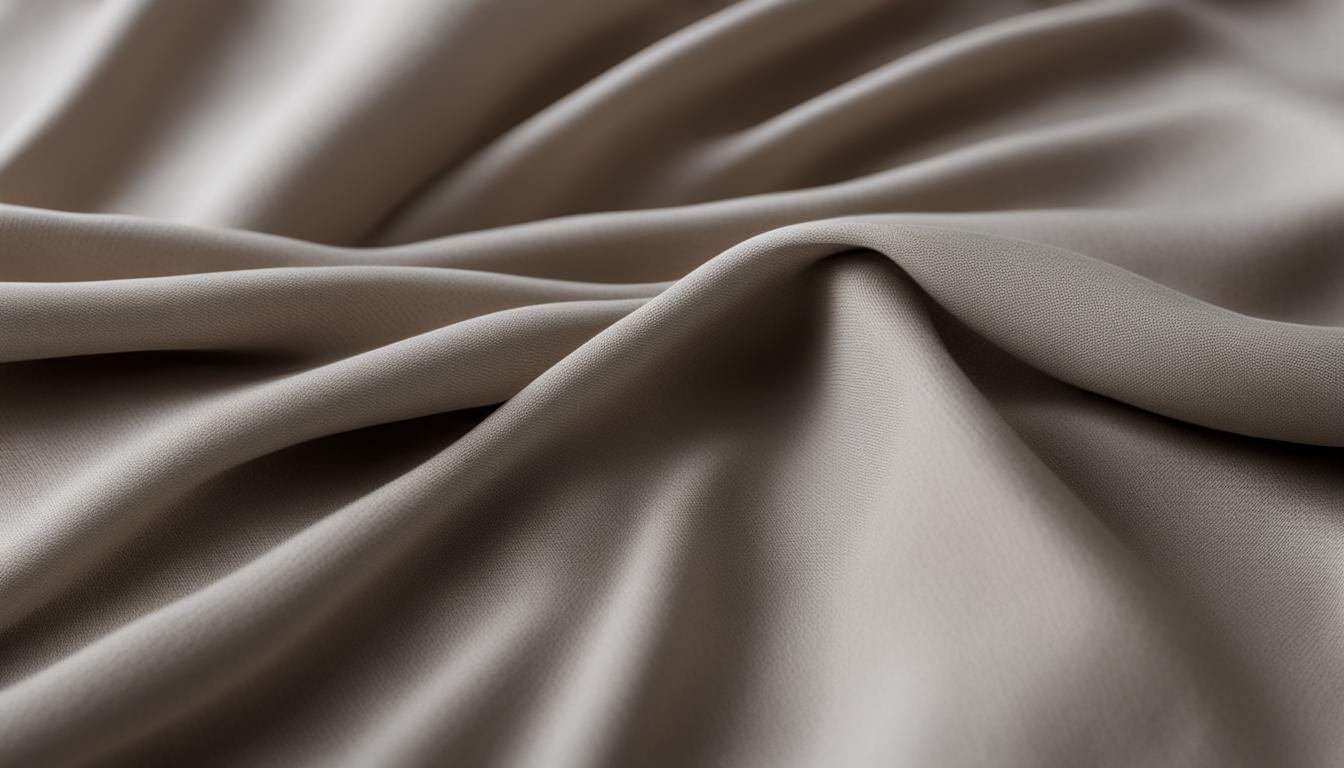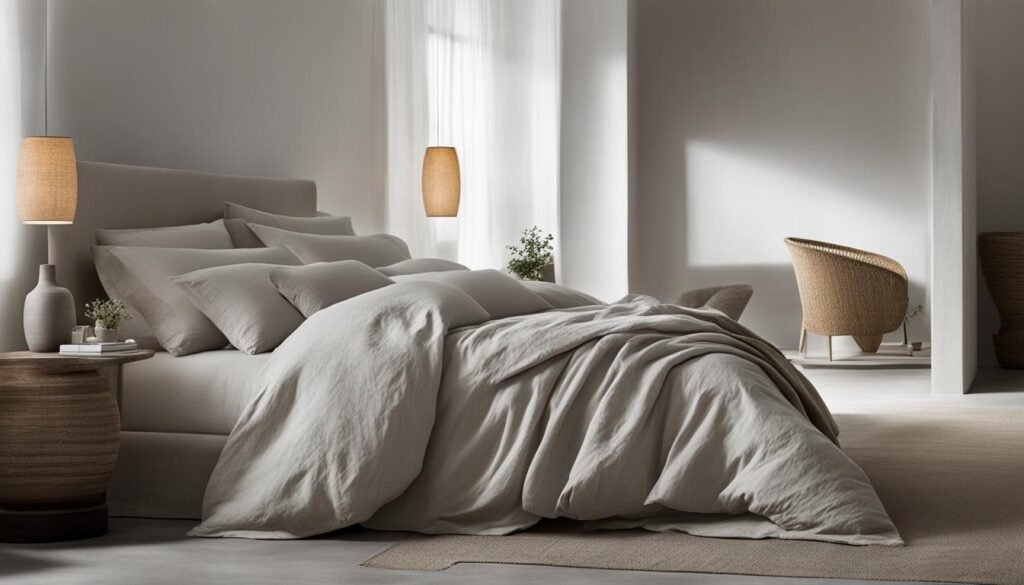Your cart is currently empty!

Soothing Benefits of Linen for Sensitive Skin
Renowned for its supreme comfort, linen has steadily gained attention as the go-to fabric for sensitive skin. Boasting natural fibers, linen provides a refreshing respite for individuals with skin sensitivity, reducing the risk of allergies and irritation. Let’s delve into the profound benefits of this revered fabric.
A product of the flax plant, linen excels in being hypoallergenic. Its unique fiber structure resists the accumulation of allergens, making hypoallergenic linen an ideal choice for those prone to allergies. Linen’s inherent breathability allows for excellent air circulation, playing a crucial role in temperature regulation and preventing excessive perspiration that may cause discomfort to sensitive skin.
One of the distinctive benefits of linen is its exceptional moisture-wicking ability. This ensures that your skin remains dry and comfortable, reducing the chances of developing skin rashes. Thanks to its innate antibacterial properties, linen assists in preventing skin infections, particularly beneficial for those with a strong sensitivity to allergies. Adding to its myriad of advantages, linen exhibits remarkable durability, thus making it a wise investment for sensitive skin care.
Key Takeaways
- Linen, a product of the flax plant, is a hypoallergenic fabric ideal for sensitive skin.
- Due to its breathability, linen facilitates excellent air circulation, aiding in temperature regulation.
- The moisture-wicking qualities of linen keep the skin dry, thereby minimizing the risk of rashes and irritation.
- Linen’s antibacterial property helps prevent skin infections, especially in allergy-prone individuals.
- The durability of linen ensures its ability to withstand frequent washing without deterioration, offering longevity in sensitive skin care.
Understanding the Hypoallergenic Nature of Linen
Linen’s reputation for being hypoallergenic and eczema-friendly originates from its natural ability to resist common irritants and allergens. This section delves into the unique properties of linen that make it a smart choice for hypoallergenic bedding and anti-allergy fabric solutions.
What Makes Linen Hypoallergenic?
The hypoallergenic nature of linen is a result of its inherent properties. Made from the flax plant, linen is a natural hypoallergenic material that offers resistance to bacteria, mould, and mildew, all of which can trigger allergies. Moreover, it is blessed with moisture-wicking properties, thereby, preventing the growth of damp-induced allergens. Thus, it’s no surprise that linen is gradually emerging as a popular choice for skin-friendly textiles.
Reducing Allergic Reactions with Linen Fabric
Combating allergies, especially nocturnal ones, can be a daunting task. However, with linen beddings, there’s a promising solution at hand. Given that linen rejects dust mites and similar pests, it significantly reduces your exposure to common allergens. Plus, the quick-drying feature of linen inhibits microbe growth, offering an added layer of protection.
Linen’s Role in a Clean and Healthy Sleep Environment
When it comes to creating a clean and healthy sleep environment, linen outshines many of its synthetic counterparts. As an antibacterial and antimicrobial fabric, linen promotes hygiene and adds to the overall cleanliness of bedding. An additional bonus – linen’s breathability enhances air circulation, offering a cool, comfortable retreat to your skin, a crucial factor for a rejuvenating sleep session.
In short, the holistic benefits of linen extend far beyond its soft, luxurious texture. For those with sensitive skin or allergy-induced skin conditions, a switch to linen can have a profound impact on experiencing a comfortable sleep and improving the quality of life.
Benefits of Linen for Sensitive Skin
In our search for the perfect fabric for sensitive skin, it’s clear that linen offers unmatched benefits. Steering beyond simply being an aesthetic preference, linen provides practical advantages for maintaining healthy skin. Ranging from its breathability to antibacterial properties, the features of this natural fabric are a boon for those pained by skin irritation and allergies. In this section, we will analyze how linen’s unique characteristics contribute to nourishing our skin.

Linen’s Breathability and Its Effect on Skin Health
The breathable linen fabric is a godsend for sustaining healthy skin. Its inbuilt capacity to allow air circulation assists in moderating body temperature, affording you the luxury of feeling cool in sweltering weather and snug when it’s chilly. This versatility makes it an all-seasons-appropriate fabric, thereby eliminating the need for frequent wardrobe renewals as weather conditions shift.
Moisture Management: Keeping the Skin Dry and Comfortable
Linen’s moisture-wicking benefits put it head and shoulders above synthetic materials when it comes to moisture control. Linen is remarkably absorbent, capable of drinking up moisture and moving it away from the skin, thus helping to keep it dry and comfortable. This natural humidity regulation decreases the likelihood of skin irritation, providing a suave and agreeable feeling, even in humid conditions.
Linen’s Antibacterial Properties: Combatting Skin Infections
Talk about an all-rounder! Linen comes power-packed with antibacterial benefits, making it an unassailable fortress against harmful bacteria. This attribute bolsters an extra layer of shield for sensitive skin and eyes vulnerable to infections. Consequently, wearing linen or employing it as bedding material could be a prudent strategy for safeguarding your skin’s health.
Durability and Longevity: Making a Wise Investment for Your Skin
Here’s the cherry on top: linen’s sterling durability makes it an optimal fabric selection for skincare. Its sturdy nature ensures fewer fabric replacements, thus protecting your delicate skin from potential discomfort caused by worn-out fabrics. What’s more, linen becomes softer with every wash, enhancing the comfort for your skin while simultaneously preserving its beneficial properties. This denotes that linen is well-equipped to endure frequent cleaning cycles without losing its hypoallergenic properties, making it a stalwart ally for your sensitive skin.
In conclusion, choosing linen is, essentially, a means of paying an upfront cost for an enduring investment in your skin’s health.
Conclusion
When it comes to caring for sensitive skin, linen fabric emerges as an exceptional choice. Its distinctive natural, hypoallergenic properties render it perfectly suited for those seeking relief from skin irritation and allergic reactions. With its inherent breathability and commendable moisture control capabilities, linen reigns supreme as a skin-friendly fabric that effortlessly balances comfort and functionality.
One of the many advantages of choosing linen for skin health is its impressive durability. Its resilience towards wear and tear, despite frequent washing, extends it as a long-term investment in skin health. Not only does it withstand the test of time, but its hypoallergenic qualities remain preserved, continually shielding your sensitive skin from potential irritants.
The prowess of linen extends beyond mere comfort. It has a key role to play in the quality of your sleep environment. The fabric naturally fends off allergens, offering a clean and soothing sanctuary, particularly beneficial for those grappling with skin conditions such as eczema. This honorably underlines the hypoallergenic advantages of linen, making it an unrivaled choice for sensitive skin care.
In conclusion, linen has triumphed over times as a potent antidote for skin ailments. Its incorporation into your wardrobe or bedding collection attests the lasting nature and benefits of this natural fabric. With linen, you are not only choosing comfort but reinforcing your stand for wellness and skin health while subtly acknowledging the soothing attributes of this ancient yet ever-relevant textile.
FAQ
What makes linen a good choice for sensitive skin?
Linen is a great choice for sensitive skin due to its hypoallergenic properties and natural fibers. The fabric is gentle on the skin, aids in temperature regulation, wicks away moisture, provides longevity, and helps avert skin infections, which all contributes to sensitive skin care.
How does the hypoallergenic nature of linen reduce allergic reactions?
Linen is naturally hypoallergenic due to the natural properties of the linen fiber. The fabric’s breathability helps fend off common allergens like dust mites, thereby reducing allergic reactions. Linen also contributes to a sanitary sleeping environment due to its antibacterial qualities.
What effect does linen’s breathability have on skin health?
The breathability of linen helps regulate body temperature which is vital for maintaining healthy skin. It provides coolness in hot weather and warmth during the cold, making it a versatile fabric for all seasons.
How does linen’s moisture management keep the skin comfortable?
Linen is excellent at absorbing and wicking away moisture, which helps prevent skin irritation by keeping the skin dry. Its antimicrobial attributes also keep harmful bacteria at bay, lending an extra layer of skin protection.
What role does linen play in combating skin infections?
Linen’s antibacterial properties can help mitigate skin infections, especially in people with sensitive skin prone to such issues. It can add an extra layer of protection by keeping harmful bacteria away.
How does linen’s durability make it a wise investment for skin care?
Linen is known for its durability, which translates to fewer fabric replacements over time. This durability helps safeguard sensitive skin from potential irritation due to worn-out fabrics. Furthermore, linen naturally softens over time with each wash, enhancing skin comfort without losing its beneficial properties.
How can linen contribute to improving overall skin health?
Linen can significantly contribute to overall skin health due to its hypoallergenic properties, breathability, moisture control, and antibacterial capacity. It offers a long-term investment in skin health. It can improve the sleep environment, act as a barrier against allergens, and bring comfort to those with skin conditions such as eczema.
Leave a Reply